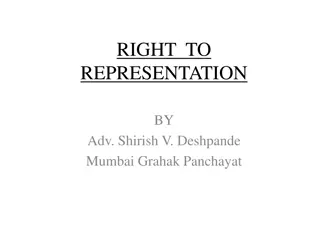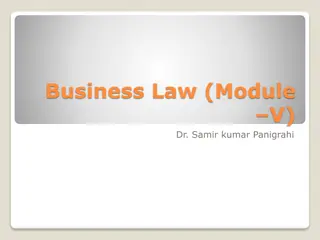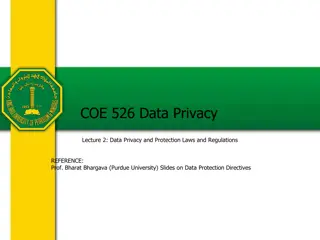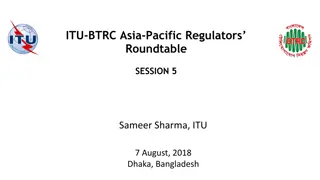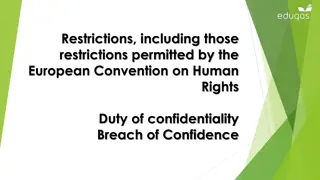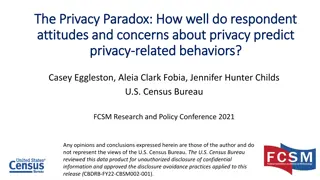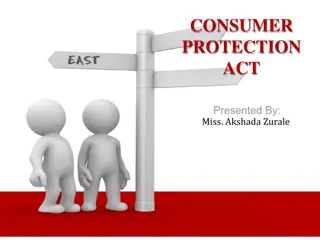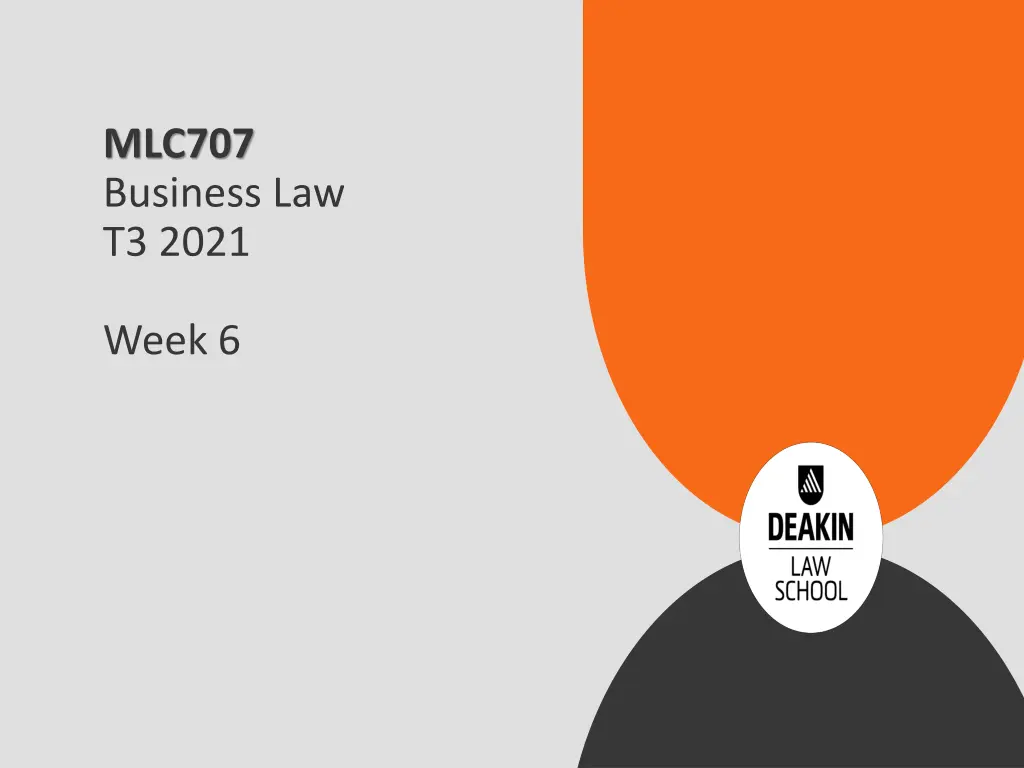
Understanding Consumer Protection in Australian Business Law
Learn about the importance of consumer protection in Australian business law, why consumers need additional protection, examples of consumer protection measures, the role of the Australian Consumer Law (ACL), and the meaning of a consumer under the law to ensure fair and transparent business practices.
Download Presentation

Please find below an Image/Link to download the presentation.
The content on the website is provided AS IS for your information and personal use only. It may not be sold, licensed, or shared on other websites without obtaining consent from the author. If you encounter any issues during the download, it is possible that the publisher has removed the file from their server.
You are allowed to download the files provided on this website for personal or commercial use, subject to the condition that they are used lawfully. All files are the property of their respective owners.
The content on the website is provided AS IS for your information and personal use only. It may not be sold, licensed, or shared on other websites without obtaining consent from the author.
E N D
Presentation Transcript
MLC707 Business Law T3 2021 Week 6
Topic 6 Consumer protection Reading: Textbook Chapter 9
Why protect consumers? Consumers are seen to be entitled to additional protection under Australian law because when dealing with a business they are usually at a disadvantage. The traditional rules of contract law offer little assistance to a consumer who is disadvantaged because of this inequality of bargaining power: the general rule is caveat emptor. Consumer protection legislation seeks to address the fundamental imbalance in bargaining power between business and consumers.
Examples of consumer protection Implying additional terms into certain contracts to protect the consumer, Prohibiting certain types of conduct by businesses, or Closely regulating certain types of transactions with consumers, such as those involving the handling of consumers personal information. There are often significant criminal and civil consequences for businesses that are found to have contravened consumer protection laws, as well as the possibility of unwelcome media attention.
Consumer protection regulation The Australian Consumer Law (ACL) is a Schedule to the Competition and Consumer Act 2010 (Cth). The ACL protects consumers by prohibiting: misleading or deceptive conduct generally, unconscionable conduct, unfair terms, and various specific forms of prohibited conduct. The ACL is administered and enforced by the Australian Competition and Consumer Commission (ACCC) and by the various State and Territory consumer protection agencies.
Meaning of consumer A persons is a consumer if they have acquired goods or services: of a kind ordinarily acquired for personal, domestic or household use or consumption, and that have not been acquired for the purpose of re- supply or for use in a manufacturing process.
Misleading or deceptive conduct A business must not, in trade or commerce, engage in conduct that is misleading or deceptive or is likely to mislead or deceive: ACL s 18. In establishing a breach of the section, the intention of the business is irrelevant. Liability cannot be avoided by use of a disclaimer. The range of remedies provided by the ACL for breach of the section is much wider than that available at common law for misrepresentation or breach of contract.
Misleading or deceptive conduct The section can be relied upon not only by consumers but also by interested members of the public and by other businesses, including competitors: Eveready Australia Pty Ltd v Gillette Australia Pty Ltd (2000)
Misleading or deceptive conduct An action for contravention of ACL s 18 may be brought in conjunction with, or as an alternative to, an action for: negligence, passing off, defamation, breach of contract, or misrepresentation.
Misleading or deceptive conduct Requirement 1: Business has engaged in conduct A business will engage in conduct if it makes a statement or a claim or a promise, performs an action, or refuses to do any of these things. In certain circumstances, even silence can be conduct: Henjo Investments Pty Ltd v Collins Marrickville Pty Ltd (1989)
Misleading or deceptive conduct Requirement 2: The conduct was in trade or commerce Conduct that takes place in a non-commercial context will not be in breach of s 18: Concrete Constructions (NSW) Pty Ltd v Nelson (1990) Durant v Greiner (1990) Pilmer v Roberts (1998)
Misleading or deceptive conduct Requirement 3: The conduct was misleading or deceptive Mislead is usually interpreted as simply meaning to lead astray or to lead into error , and deceive is interpreted as to cause to believe what is false . In deciding whether conduct is misleading or deceptive the court will use an objective test: Taco Company of Australia Inc v Taco Bell Pty Ltd (1982)
Misleading or deceptive conduct Taco Company of Australia Inc v Taco Bell Pty Ltd (1982) 42 ALR 177: First, it is necessary to identify the relevant section (or sections) of the public (which may be the public at large) by reference to whom the question of whether the conduct is, or is likely to be, misleading or deceptive falls to be tested. Second, once the relevant section of the public is established, the matter is to be considered by reference to all who come within it, including the astute and the gullible, the intelligent and the not so intelligent, the well educated as well as the poorly educated, men and women of various ages pursuing a variety of vocations.
Misleading or deceptive conduct Franki J in Annand & Thompson Pty Ltd v TPC (1979): Broadly speaking, it is fair to say that the question is to be tested by the effect on a person, not particularly intelligent or well-informed, but perhaps of somewhat less than average intelligence and background knowledge, although the test is not the effect on a person who is, for example, quite unusually stupid.
Misleading or deceptive conduct A statement that is literally true can still be misleading or deceptive. A statement that is not literally true is not necessarily misleading or deceptive.
Unconscionable conduct A business will engage in unconscionable conduct if it unfairly takes advantage of another person s special weakness or disability. There are two types of unconscionable conduct prohibited by the ACL: unconscionable conduct generally: ACL s 20, and unconscionable conduct when supplying goods or services to, or acquiring goods or services from, a person other than a listed public company: ACL s 21.
Unfair terms A term of a contract will be unfair in contravention of ACL s 23 and therefore void if: the contract is a consumer contract; the contract is a standard form contract; and the term is unfair.
Unfair terms According to ACL s 24(1), a term of a consumer contract is unfair if : it causes a significant imbalance in the parties rights and obligations arising under the contract; it is not reasonably necessary to protect the legitimate interests of the business; and it would cause detriment to the consumer. Director of Consumer Affairs Victoria v AAPT Limited (2006)
Specific prohibitions ACL s 29 A business must not make a false representation: that its goods are of a particular standard, quality, value, grade, composition, style or model or have had a particular history or particular previous use, that its goods are new, that it has a sponsorship, approval or affiliation it does not have, with respect to the price of its goods or services, concerning the availability of facilities for the repair of its goods or of spare parts for its goods, concerning the place of origin of its goods, or concerning the existence, exclusion or effect of any condition, warranty, guarantee, right or remedy.
Specific prohibitions: other examples A business must not engage in bait advertising: ACL s 35. A business engages in bait advertising when it advertises a product at a price that is likely to attract buyers to its premises when it knows or should know that it is likely to run out of stock very quickly. A business must not accept payment from a buyer when it either does not intend to supply the product or it knows or should know that it will be unable to provide the product within the specific time or a reasonable time: ACL s 36.
Specific prohibitions Inertia selling is sending an unsolicited product to a person and then pressuring the person to pay for that product: ACL s 40 A business must not claim a right to payment unless it reasonably believes that it in fact has a right to payment If a business has sent an unsolicited product to a person, the person: o does not have to pay for it, and o is not liable for the loss of or damage to the product unless the loss or damage results from a wilful and unlawful act. After the expiry of a certain period, the product becomes the property of the person, free of charge.
Specific prohibitions A pyramid scheme is a type of product distribution scheme whereby a participant makes a profit or receives a commission for the sale of each product to a buyer; the participant is also rewarded for the introduction of other participants to the scheme, usually by receiving a commission for each new participant: ACL s 44 A business is prohibited from participating in, or inducing others to participate in, a pyramid selling scheme
Consumer guarantees The ACL implies into contracts for the sale of goods to consumers guarantees that: the seller has title: ACL s 51; the consumer will have undisturbed possession: ACL s 52; there are no undisclosed securities: ACL s 53; the goods are of acceptable quality: s 54; the goods are fit for any disclosed purpose: s 55; the goods correspond with their description: s 56;
Consumer guarantees The ACL implies into contracts for the sale of goods to consumers guarantees that: the goods correspond with any sample or demonstration model in quality, state or condition: s 57; the manufacturer will ensure that repair facilities and spare parts are reasonably available: s 58; and the manufacturer will comply with any express warranties given in relation to the goods: s 59.
Consumer guarantees The ACL implies into contracts for the supply of services to consumers guarantees that: the services will be rendered with due care and skill: s 60; the services, and any product resulting from the services, will be fit for any disclosed purpose: s 61; and the services will be supplied to the consumer within a reasonable time: s 62. Unlike the terms implied by the SGA, these guarantees cannot be excluded.
Information standards ACL Part 3-4 regulates the use of information standards for goods or services. An information standard sets out the form and content of the information that must accompany the supply of goods or services (for example, on the product packaging): ACL s 134. A business must not, in trade or commerce, supply goods or services if the relevant information standard has not been complied with: ACL ss 136-7.
Consequences of contravention If a business breaches a general prohibition it may be the subject of a civil action (e.g., it can be sued for compensation) but there are no criminal penalties. If a business breaches one of the specific prohibitions it may be the subject of both a civil action and a criminal penalty such as a fine (up to $10 million for companies and $500,000 for individuals. Note: previously up to $1.1 million for companies and $220,000 for individuals.) Penalties are also imposed for breach of any of the consumer guarantees.
Consequences Remedies that can be granted by a court for contravention of the ACL include: pecuniary penalties; injunctions; an order that the defendant pay damages to any person who has suffered loss because of the contravention: a compensation order for injured persons; an order declaring a contract void, varying a contract, refusing to enforce a contract, ordering a refund, ordering compensation, ordering repair of the goods, or ordering the provision of services;
Consequences Remedies that can be granted by a court for contravention of the ACL include: non-punitive orders including orders directing the defendant to perform a community service, directing them to establish compliance and education programs for their employees, requiring them to disclose information, or requiring them to place an advertisement; an adverse publicity order; and an order disqualifying a person from managing a corporation.
Consequences Where a business has failed to comply with a consumer guarantee and the non-compliance is not a major failure, the consumer can require the business to remedy the failure within a reasonable time. The business can remedy the non-compliance by: curing the defect in title (if any), repairing the goods, replacing the goods, or providing a refund.
Consequences Where the non-compliance is a major failure or cannot be remedied, the consumer can reject the goods (that is, return the goods for a refund or a replacement) or require the business to pay to the consumer the difference between the value of the goods and the price paid for them. The consumer also has rights against the manufacturer.
Information privacy Personal information about individuals has commercial value. However, when dealing with an individual s personal information, a business must comply with its obligation to respect the individual s privacy. The Privacy Act 1988 (Cth) originally applied only to Commonwealth government departments. The Act now applies if a business has an annual turnover of more than $3 million.
Australian Privacy Principles In 2012, the Privacy Amendment (Enhancing Privacy Protection) Act 2012 (Cth) enacted a single set of Australian Privacy Principles (APPs) that apply to both the private sector and the public sector. These changes commenced in March 2014. The APPs seek to ensure that businesses that hold information about individuals handle that information responsibly. They also give individuals some control over the way information about them is handled.
Australian Privacy Principles The APPs are drafted in a way that is technology-neutral, and they apply equally to conventional, electronic and digital environments
Privacy protection The Privacy Act s APPs protect: personal information: information or an opinion about an individual whose identity is apparent, or can reasonably be ascertained, from the information or opinion
Privacy protection The Privacy Act s APPs protect: sensitive information: information or an opinion about an individual s racial or ethnic origin, political opinions, membership of a political association, religious beliefs or affiliations, philosophical beliefs, membership of a professional or trade association, membership of a trade union, sexual preferences or practices, criminal record or health.
13 Australian Privacy Principles There are thirteen APPs: APP 1 Open and transparent management of personal information APP 2 Anonymity and pseudonymity APP 3 Collection of solicited personal information APP 4 Dealing with unsolicited information APP 5 Notification of collection of personal information APP 6 Use and disclosure of personal information
13 Australian Privacy Principles There are thirteen APPs: cont. APP 7 Direct marketing APP 8 Cross-border disclosure of personal information APP 9 Adoption, use or disclosure of government related identifiers APP 10 Quality of personal information APP 11 Security of information APP 12 Access to personal information APP 13 Correction of personal information.
Infringement If an individual thinks that a business has breached the APPs, they can complain to the Office of the Australian Information Commissioner. When the office receives the complaint the individual will, in most cases, be referred back to the business to give the business a chance to resolve the complaint itself.
Infringement If the business and the customer cannot resolve the complaint, the Office will conciliate the complaint. The Privacy Commissioner can make a formal determination, enforceable by the Federal Court of Australia. If a business fails to comply with its own stated privacy policy it also risks being found to have breached ACL s 18.
Topic 6: Competition Law Reading: Ch 12 of Business Law by Nick James on Dealing with Competitors (see PDF document posted in Week 6 Resources folder).
Protecting competition It is widely believed that competition within a market is good for consumers and good for the economy. Competition law seeks to protect and enhance competition by regulating and prohibiting certain actions by businesses, including certain arrangements between competitors and other agreements that artificially maintain or inflate prices. Competition in Australia is regulated by the ACCC under Part IV of the Australian Competition and Consumer Act 2010 (Cth).
Competition regulation Part IV of the CCA promotes competition by prohibiting certain trade practices that have the effect of substantially lessening competition in the market.
Per se offences Some forms of conduct are so obviously anti-competitive that they are prohibited outright: cartel conduct misuse of market power, price-fixing, resale price maintenance, and primary boycotts.
Key concepts Three important terms used throughout the legislation: market: the area of close competition between firms or, putting it a little differently, the field of rivalry between them, competition: includes competition from imported goods or from services rendered by persons not resident or not carrying on business in Australia, substantially lessening competition: Substantial has been variously defined as large, weighty, big, real, of substance.
Prohibited conduct: Cartel conduct A cartel is a contract, arrangement or understanding between two or more competitors that lessens competition by, for example, fixing prices, controlling outputs, rigging bids or allocating customers. They can be formed in any industry. They can be between small, local businesses or well- known multinationals.







